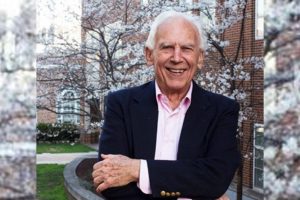
This story was written by our colleagues with Johns Hopkins Medicine.
J. Thomas August, M.D., a pioneer in immunology and vaccine development and director of the pharmacology department at Johns Hopkins for 23 years, died Feb. 11 from metastatic cancer. He was 91.
August founded Immunomic Therapeutics Inc. (ITI) with William Hearl, Ph.D., in 2006. In 2015, ITI entered into an exclusive worldwide license agreement with Astellas Pharma Inc. of Japan with respect to ITI’s LAMP technology for an upfront payment of $300 million. This remains, to date, the largest deal to come out of Johns Hopkins Technology Ventures.
During the early part of his career, August focused on endocrinology, but turned to molecular biology by the 1960s. In 1980, he discovered proteins in the membranes of tiny structures within cells, called lysosomes, which act as transport vehicles to shuttle cellular contents into and out of the cell. August found that the proteins, called lysosome-associate membrane proteins (LAMPs), help to activate the immune system by delivering foreign substances or “antigens” to other immune system cells.
The discovery revolutionized the field of immunology as scientists began to develop vaccines that could leverage the ability of LAMPs to inform the immune system of antigens that pose a threat to the human body. In recent decades, August studied the development of vaccines to target viruses such as HIV, dengue, influenza and West Nile.August was a 1954 graduate of Stanford University’s school of medicine. He trained in medicine at the Royal Infirmary, University of Edinburgh in Scotland, was a resident at Beth Israel Hospital in Boston and a research fellow in medicine at Harvard Medical School. He was a faculty member at Stanford and New York University before he was appointed the Siegfried Ullmann Professor of Molecular Biology, chair of the Department of Molecular Biology and director of the Division of Biological Sciences at Albert Einstein College of Medicine.
He came to Johns Hopkins in 1976 as the director of the Department of Pharmacology and Experimental Therapeutics, as it was called then. Under his tenure, between 1976 and 1999, the department shifted its focus to molecular biology and virology.
“It is hard to exaggerate the personal and scientific impact of Tom on our department. The example he set in terms of pursuing creative and innovative research with direct application to human health was inspiring, and his gracious demeanor and warmth will always be with us,” says James Stivers, Ph.D., professor and interim director of pharmacology and molecular sciences at the Johns Hopkins University School of Medicine.
August was known as a gifted teacher and mentor who trained dozens of students who have gone on to lead successful careers in immunology and other fields.
“Dr. August was an amazing scientist who came up with bold and novel ways to solve important questions in immunology, cell biology and medicine. He taught scores of postdoctoral and graduate students to be independent thinkers and researchers, and in doing so, prepared them for successful careers in the sciences,” says Linda M. Arterburn, Ph.D., who was one of August’s trainees at Johns Hopkins and is now vice president, scientific and clinical affairs at Medifast/Jason Pharmaceuticals.
August was associated with Cold Spring Harbor Laboratory, as a scientist and board member, while it was under the directorship of John Cairns in the 1960s and 1970s. He collaborated and consulted with other researchers and worked at the California Institute of Technology, the Salk Institute, Uppsala University, Oxford University, Johns Hopkins Singapore, where he served several years as director of the Division of Biomedical Sciences, and led a vaccine and epitope discovery research project in Recife, Brazil, with colleague Ernesto Marques, M.D., Ph.D., who was at Johns Hopkins at the time.
August was named a University Distinguished Service Professor at the Johns Hopkins University School of Medicine in 2001. He was the Markle Scholar in Medicine Sciences at Stanford from 1960 to 1965, a fellow of the John Simon Guggenheim Memorial Foundation, a recipient of the Johnson and Johnson Focused Giving Award and fellow of the American Association for the Advancement of Science.
He held eight patents on vaccine-related technology and published hundreds of scientific articles in academic journals.
August, born in Whittier, California, in 1927, was the youngest of six children of John and Elizabeth August. He served in the United States Army, stationed in Alaska. In Baltimore, he resided in the Poplar Hill neighborhood with Jean Nordstrom August, his wife of 67 years. He is survived by his children, Christina E. August Hecht (Kenneth), Paul Nordstrom August and Stephen Thomas “Tom” August (Cara), five grandchildren and three great-grandchildren.
A memorial service at the Johns Hopkins University School of Medicine is being planned.